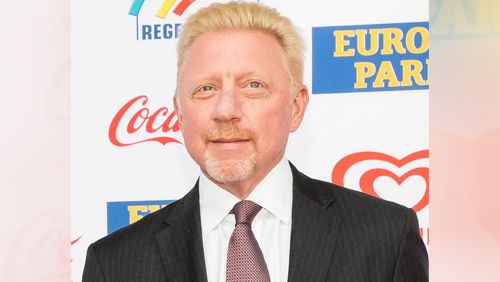We live in a time where tennis greats all hail from Europe. Where once we loved the American icons such as Pete Sampras and Andre Agassi or worshipped the Antipodean artistry of Lleyton Hewitt or Pat Rafter, we now look up to the Holy Trinity from the European countries of Spain, Serbia and Switzerland. Rafael Nadal, Novak Djokovic and Roger Federer have changed tennis history and given the game a future where other European players will have to reach the top of their craft to live up to the reputations that preceded them.
Three decades ago, three other European heavyweights redefined the era in which they played. German phenomenon Boris Becker, Swedish serve & volley specialist Stefan Edberg and clay court craftsman Ivan Lendl all commanded huge respect as they carved out careers that stand up to scrutiny today. We continue our look at this Heilige Dreifaltigkeit – that’s German for Holy Trinity – by focusing on the Leimen-born Boris Franz Becker, the man who would become Wimbledon champion before he even was a man.
To say that Boris Becker burst onto the tennis scene would be an understatement. In fact, Becker’s development and progression even surprised himself at the time of him winning Wimbledon. An unseeded player – the last to win Wimbledon 35 years later – Becker flew through the competition, winning the final against Kevin Curran in four sets, becoming the youngest-ever Grand Slam champion at the age of 17 years and 227. While this record would be eclipsed by Michael Chang, who shocked the world when he won the French Open in 1989 while 117 days younger, Becker’s record still stands at Wimbledon, with no-one getting close to his prodigious achievement.
Becker’s game was built around a rock-solid first serve, with his swinging body generating devastating power that had his opponents on the back foot immediately. He was a mean returner of the ball and his forehand was a booming one. His defence of the Wimbledon title aged 18 the next season, winning in straight sets against the Czechoslovakian player Ivan Lendl was a masterclass in how to play on grass, the clay court favouring Lendl made to look like a fish out of water by the teenager.
While Becker’s game was developing at a rate of knots, he would not win the next two Wimbledons, losing in the 2nd round to the unfancied Peter Doohan, rated 70th in the world at the time, and Stefan Edberg in 1988, the Swede getting the better of his great serve-volley rival in four sets. Becker would get his revenge in 1989, winning in three sets in one of the best performances ever seen in SW19:
When the pair met again in the Wimbledon final of 1990, Edberg it was who took the crown, winning their ‘best of three’ consecutive finals in five grueling sets. However, what endeared Boris Becker to millions of tennis fans wasn’t just how good he was, or how young he was at the point of being in the prime of his sporting life. Becker simply never gave up on a point, and was prepared to dive across the court and often leap up from the deck to get to the ball in order to win.
While Boris Becker’s development was rapid, he didn’t burn out. Winning Wimbledon in 1985 aged just 17 could have seen him enjoy a career similar to Martina Hingis rather than Pete Sampras. Becker had three enduring rivalries with players who were around at the time.
Becker had a head-to-head record of 25 wins to 10 losses against Swedish superstar Stefan Edberg, a 10-11 close but losing record against Ivan Lendl and an 8-4 winning record against fellow German Michael Stich. Again, Becker’s endearing nature of releasing emotions held him in good stead with the fans, the ice-cool Michael Stich looking like a robot to the more human Becker.
While Becker’s emotions on court were part of his appeal, off the court, he experienced relationship troubles, with four children and several high-profile relationships seeming to end in the tabloid newspapers after dramatic incidents from the German’s personal life were written about in the press. The man who wore his heart on his sleeve on the court seemed to be punished for living his life the same way.
Winning three Wimbledon titles (in 1985, 1986 & 1989), two Australian Open titles (1991 & 1996) and a single U.S. Open title in 1989, Boris Becker won a total of six Grand Slams. His opponents rated him extremely highly, with Pete Sampras saying after a defeat to Becker in Stuttgart in 1996, “Becker is the best indoor player I’ve ever played.” In 2012, Boris Becker spoke of his early success and the effect it had on him.
“I had won so much by 22, a number of Wimbledon titles, US Open, Davis Cup, World number one,” he said. “You look for the next big thing and that isn’t in tennis.”
Becker’s retirement came in 1999, his career brought to an end as a new millennium dawned, and new serve-volley players had come and gone. As if proving the regenerative powers of tennis to produce superstars, a young Roger Federer would emerge from the amateur game at the same time.
Becker would move on to play poker, host TV quiz shows and commentate on Wimbledon itself from 2003 to the present day. Experiencing money troubles, Becker was declared bankrupt in 2017, an action that saw him forced to sell his U.S. Open title trophy and other memorabilia for £687,000. With his bankruptcy extended last year to last a further 12 years until 2031, Becker will be clearing his debt for some time.
The debt that tennis owes him is priceless and will never be repaid.